
International education and its constituents including students, parents, teachers, and educational institutions across the world have felt the effects of the pandemic in one way or more. Since the onset of the pandemic, the British Council has been undertaking surveys to assess the impact on students’ decisions and aspirations to study in the UK through perception surveys of students and agents in our endeavour to understand the ground situation and share insights more widely for a considered and informed response. Our last survey report can be found here.
This survey focuses on India in particular, having been red listed by the UK government in the wake of the second wave which spread through the country during months of March to June 2021. As per the rules, people travelling from red listed countries can only enter if they have residential rights. Although students with a valid full time study visa are included in this category, they would still have to complete a quarantine programme in a managed hotel with tests and other protocols.
The survey sought to examine how these travel restrictions will affect students’ decisions to continue with their initial plans to study in the UK in the academic year 2021 and help UK universities understand and consider appropriate response to Indian students’ needs.
An online survey consisting of seven questions was conducted with students on our databases collected through our various events and activities and needed no more than three minutes to complete. A total of 243 students took part in the survey but based on their response to the second question to confirm their initial plan to study overseas in the 2021-22 academic year, the sample was validated as 221 students. The findings from point three onwards are based on the interpretation of the validated sample.
1) 87% of the respondents are under 30 years of age
A detailed age profile of students who have filled the survey comprises 49% in the 20-25 age group, 23% aged 17-20, and 15% aged 26-30. The remaining 11% were in the older category and 2% were in the younger group of 13-16 years old.
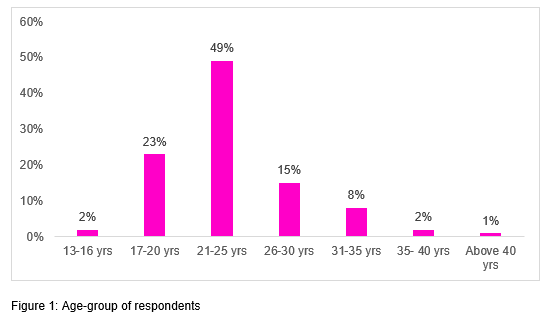
2) About 91% of students had originally planned to study overseas this year
The survey asked students to indicate their initial plans for the academic year 2021 by choosing between the UK, UK and any other overseas country, other overseas country, and no overseas study plans at all. The UK was favoured by 51% of the respondents as their sole choice. Another 37% chose UK and any other overseas country where students were not completely decided but indicates UK holding significant place in students’ considerations. A small proportion of 9% had no intention to study abroad and have been excluded from further analysis.
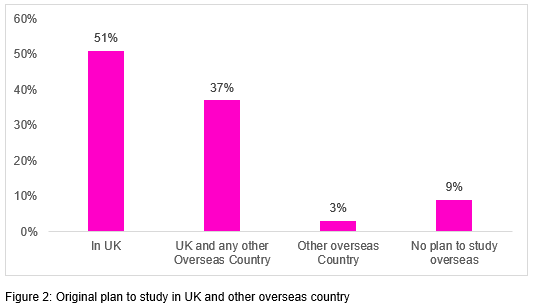
3) 69% of respondents want to study a masters’ course abroad
Postgraduate study continues to be the most popular programme for study abroad as has been seen historically. The interest of respondents towards undergraduate and PhD programmes are quite equally distributed. They together form 30% of the total respondents planning to study abroad.

4) 91% of students report knowledge about India in the UK’s red list country category
Awareness amongst respondents about India’s red listing and the related rules is high. The communication campaigns led by UKVI, the British Council and others has been effective in reaching out to the target audience. The learnings from previous student perception survey about improving communications helped inform the strategy. Special communications placed on the British Council website, social media posts, live sessions for students, agents and counsellors have been some of the activities that contributed to the effective communication campaign.
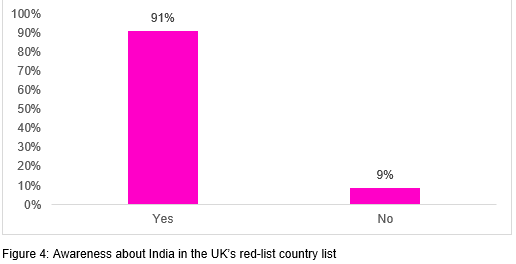
5) 60% of students will continue with their initial plans to study in the UK in academic year 2021
Three out of every five students surveyed wants to continue with their plans to study a UK course in 2021, with a further quarter who would like to defer their study plans to the UK to next year. These both data points show a marginal increase in student sentiment to pursue their plans in the academic year and a marginal decline in deferral to next year when compared with the Agent survey of December 2020. The agent survey had reported that ‘Finally, agents were asked about the study plans of students who had applied to study in the UK in the current academic year. A little over half of respondents said that students were “very likely” to start their studies in the UK in January, with 28 per cent saying that deferral to next academic year was very likely’.
In addition, 8% students indicated their plans to opt for another country because of red listing restrictions which still is a sharp reduction from the 16% seen in the agent survey report.
The composition of the 60% of students wishing to continue with plans to study in the UK in academic year 2021 has three quarters of this group (45% of the overall total) agreeable to be hotel quarantined and follow all instructions and the remaining 15% preferring to opt for online classes at first and move to the UK later.
Both masters and PhD student aspirants had similar proportions of students wanting to continue their plans to join a UK course this year at around 55% even with the red list restrictions, while the proportion of undergraduate aspirants was higher at 70%. Around one in ten undergraduate aspirants want to defer their study plans to next year in comparison to one third of the masters and PhD aspirants.
Asking students directly about their intended course start date confirms that, among the group who said they intended to come to the UK in the 2021/22 academic year, 73 per cent want to start their programme in September while 27 per cent said they intended to come to the UK in January 2022. Prospective master’s degree students are the most likely to persist with a September start date whereas undergraduates are more likely to want to delay until January.
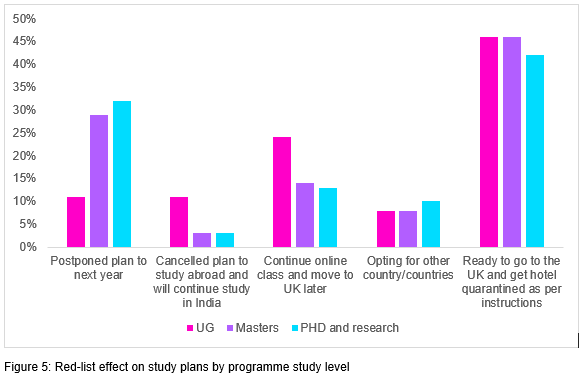
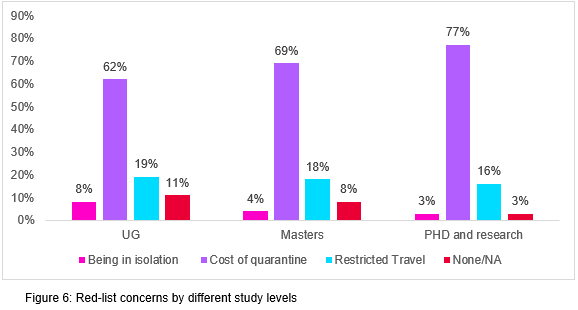
The positive intent of prospective students towards studying in the UK is high despite the quarantine cost and travel concern.The Agent survey of December 2020 also noted that although the pandemic caused a noticeable decrease in Indian students’ interest in studying overseas, the UK has not been impacted as negatively as the Indian student market as a whole.It is therefore critical for the UK universities to adequately prepare and manage expectations in order to maintain the momentum of the favourable sentiment.
Author: Sandeepa Sahay, Coordinator, Education Insight Hub South Asia
Deepika Baruah, Project Manager, Education, India

Add new comment
Please note that comments by non-members are moderated. They do not appear on the site until they have been approved. Comments by registered members appear here immediately. Your email address will not be published. All fields are required.